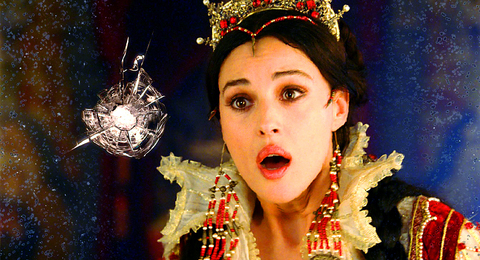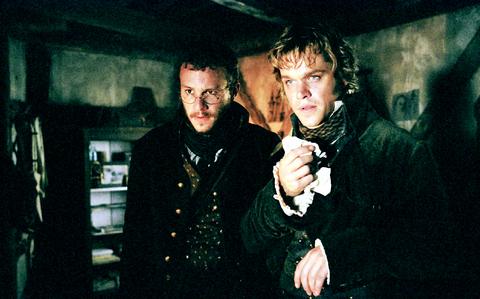There's no happy ending for The Brothers Grimm, or a happy beginning or middle, for that matter.
That's the one consistent thing in Terry Gilliam's latest film, which is plagued by inconsistency.
Certainly, you expect some weirdness walking into one of Gilliam's movies. After all, this is the man who crafted the ``Monty Python'' animation, who has brought fantastical figures to the screen as the director of films including The Adventures of Baron Munchausen and Fear and Loathing in Las Vegas. This is the man whose famously failed attempt at making a wildly ambitious Don Quixote movie was the subject of its own documentary, Lost in la Mancha.

PHOTOS COURTESY OF FOX MOVIES
But those films had the benefit of a singular vision. Working from a script by Ehren Kruger, writer of The Ring movies, Gilliam is all over the place here. It's as if he doesn't know what he wants his film to be. A loopy farce? A lavish costume piece? A high-energy action film? At times it even feels as if this is Gilliam's anti-war film, framed within the context of a comedic fairy tale.
In an enchanted forest outside a German village in 1798, trees crawl and branches snarl, and a wolf turns into a man before turning back into a wolf again, but you can find your way out of the darkness by licking the head of the wise Grandmother Toad. (Though for all the film's elaborate pretensions, the effects look unexpectedly schlocky; that was true at times in Gilliam's Time Bandits, too, but there the aesthetic seemed
intentional.)

Classic characters like Rapunzel, Little Red Riding Hood and Hansel and Gretel come and go, but they aren't used to their full potential, they appear so randomly they seem like afterthoughts. Although the Gingerbread Man, who forms from a glob of black goo at the bottom of a well, is awfully cute. Then he eats a small child.
In the midst of all this madness are Matt Damon and Heath Ledger as brothers Will and Jacob Grimm, fictionalized incarnations of the real-life brothers behind all those famous fairy tales, Wilhelm and Jacob Grimm. Con men who make their money pretending to drive demons and monsters out of small towns, Will and Jake are found out and forced to investigate a truly cursed forest where little girls are disappearing.
The actors seem to be having a good time bouncing off each other, with Damon reveling in the flashier of the two roles as the more gregarious Grimm (and affecting a passable British accent). But neither brother is terribly well fleshed-out, though a subplot harkening to their childhood -- and an unfortunate acquisition of magic beans -- is meant to convey longtime resentments.
So when Jacob pleads to Will, ``You're my brother -- I want you to believe in me,'' the moment lacks the resonance for which it strives. Similarly, a love triangle between the brothers and Angelika (Lena Headey), a beautiful and butt-kicking forest tracker whose two sisters are among the missing, rings hollow and feels tacked-on.
On horseback with her long hair and striking features, Headey is the most dynamic of all the movie's creatures. Meanwhile, Gilliam squanders stage veteran Jonathan Pryce in the role of General Delatombe, the French governor who has taken over the German countryside (and sent the Grimms on their mission). The character is smothered by stilted dialogue and a broad, fake accent.
As an Italian henchman
assigned to follow and torment the brothers, Peter Stormare is even more over the top, which is jarringly uncharacteristic. Stormare is an actor who's most powerful doing more with less -- just look at his performance as a mute hit man in Fargo. Here he's a grating stereotype.
Then again, nearly everything about the film grates. Fairy tales are supposed to be a little scary, The Brothers Grimm too often feels like an overbearing, interminable nightmare.
The Brothers Grimm, a Dimension Films and MGM Pictures release, runs 118 minutes. One-and-a-half stars out of four.

On April 26, The Lancet published a letter from two doctors at Taichung-based China Medical University Hospital (CMUH) warning that “Taiwan’s Health Care System is on the Brink of Collapse.” The authors said that “Years of policy inaction and mismanagement of resources have led to the National Health Insurance system operating under unsustainable conditions.” The pushback was immediate. Errors in the paper were quickly identified and publicized, to discredit the authors (the hospital apologized). CNA reported that CMUH said the letter described Taiwan in 2021 as having 62 nurses per 10,000 people, when the correct number was 78 nurses per 10,000

As we live longer, our risk of cognitive impairment is increasing. How can we delay the onset of symptoms? Do we have to give up every indulgence or can small changes make a difference? We asked neurologists for tips on how to keep our brains healthy for life. TAKE CARE OF YOUR HEALTH “All of the sensible things that apply to bodily health apply to brain health,” says Suzanne O’Sullivan, a consultant in neurology at the National Hospital for Neurology and Neurosurgery in London, and the author of The Age of Diagnosis. “When you’re 20, you can get away with absolute

May 5 to May 11 What started out as friction between Taiwanese students at Taichung First High School and a Japanese head cook escalated dramatically over the first two weeks of May 1927. It began on April 30 when the cook’s wife knew that lotus starch used in that night’s dinner had rat feces in it, but failed to inform staff until the meal was already prepared. The students believed that her silence was intentional, and filed a complaint. The school’s Japanese administrators sided with the cook’s family, dismissing the students as troublemakers and clamping down on their freedoms — with

As Donald Trump’s executive order in March led to the shuttering of Voice of America (VOA) — the global broadcaster whose roots date back to the fight against Nazi propaganda — he quickly attracted support from figures not used to aligning themselves with any US administration. Trump had ordered the US Agency for Global Media, the federal agency that funds VOA and other groups promoting independent journalism overseas, to be “eliminated to the maximum extent consistent with applicable law.” The decision suddenly halted programming in 49 languages to more than 425 million people. In Moscow, Margarita Simonyan, the hardline editor-in-chief of the